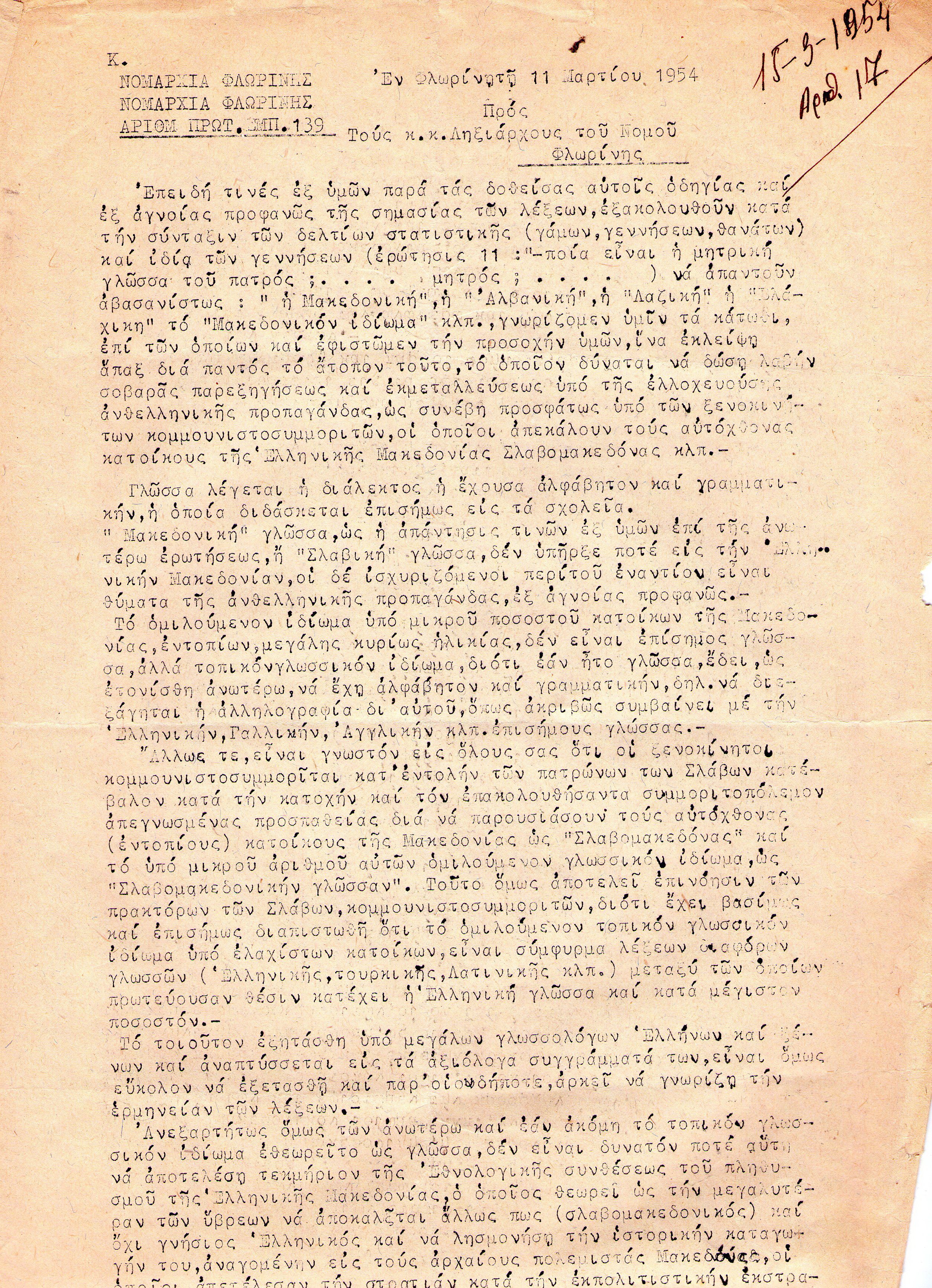
Greek:
ΜΗΤΡΙΚΗ ΓΛΩΣΣΑ Η ΜΑΚΕΔΟΝΙΚΗ
Οι κάτοικοι του νομού Φλώρινας το 1954, στα έντυπα που συμπλήρωναν για την έκδοση προσωπικών εγγράφων, ληξιαρχικών πράξεων γέννησης, γάμου, θανάτου, ανέφεραν ότι η μητρική τους γλώσσα, όπως και η γλώσσα των γονέων τους, είναι η μακεδόνικη. Επίσης μέρος του πληθυσμού ανέφερε ως μητρική γλώσσα τη βλάχικη, την αλβανική, τη λαζική κτλ. αυτό το επιβεβαιώνει και αναφέρει η Διοίκηση και ο Νομάρχης του νομού Φλώρινας, ο οποίος σε συμφωνία με τα «εθνικά ιδεώδη» του κράτους, διατάσει όλους τους ληξίαρχους και υπαλλήλους να συμπληρώνουν στο τμήμα της γλώσσας, μόνο την ελληνική. Εκτός των ληξιάρχων, το έγγραφο αυτό είχε σταλεί και στα Υπουργεία Εσωτερικών και Εξωτερικών. Αριθμός εγγράφου 139. Ημερομηνία έκδοσης 11 Μαρτίου 1954 Φλώρινα. Υπογράφει ο Νομάρχης Κ.Τουσίλδης.
Οι κάτοικοι του νομού Φλώρινας το 1954, στα έντυπα που συμπλήρωναν για την έκδοση προσωπικών εγγράφων, ληξιαρχικών πράξεων γέννησης, γάμου, θανάτου, ανέφεραν ότι η μητρική τους γλώσσα, όπως και η γλώσσα των γονέων τους, είναι η μακεδόνικη. Επίσης μέρος του πληθυσμού ανέφερε ως μητρική γλώσσα τη βλάχικη, την αλβανική, τη λαζική κτλ. αυτό το επιβεβαιώνει και αναφέρει η Διοίκηση και ο Νομάρχης του νομού Φλώρινας, ο οποίος σε συμφωνία με τα «εθνικά ιδεώδη» του κράτους, διατάσει όλους τους ληξίαρχους και υπαλλήλους να συμπληρώνουν στο τμήμα της γλώσσας, μόνο την ελληνική. Εκτός των ληξιάρχων, το έγγραφο αυτό είχε σταλεί και στα Υπουργεία Εσωτερικών και Εξωτερικών. Αριθμός εγγράφου 139. Ημερομηνία έκδοσης 11 Μαρτίου 1954 Φλώρινα. Υπογράφει ο Νομάρχης Κ.Τουσίλδης.
MOTHER TONGUE MACEDONIAN
The inhabitants of Florina in 1954, completed the forms for issuing personal documents, birth registry, marriage, death, reported that the mother tongue as the language of their parents, is Macedonian. Also part of the population reported a mother tongue of the Vlach, Albanian, etc. Laziki to this report confirms the Administration and the Prefect of Florina, which is in agreement with the "national ideals" of the state, stretching all the registrar and employees to fill in part of the language, only the Greek. In addition to the registrar, the letter was sent to the Ministries of Interior and Foreign Affairs. Document number 139. Date March 11, 1954 Florina. Signed by the Prefect K. Tousildis.
The inhabitants of Florina in 1954, completed the forms for issuing personal documents, birth registry, marriage, death, reported that the mother tongue as the language of their parents, is Macedonian. Also part of the population reported a mother tongue of the Vlach, Albanian, etc. Laziki to this report confirms the Administration and the Prefect of Florina, which is in agreement with the "national ideals" of the state, stretching all the registrar and employees to fill in part of the language, only the Greek. In addition to the registrar, the letter was sent to the Ministries of Interior and Foreign Affairs. Document number 139. Date March 11, 1954 Florina. Signed by the Prefect K. Tousildis.

Comment